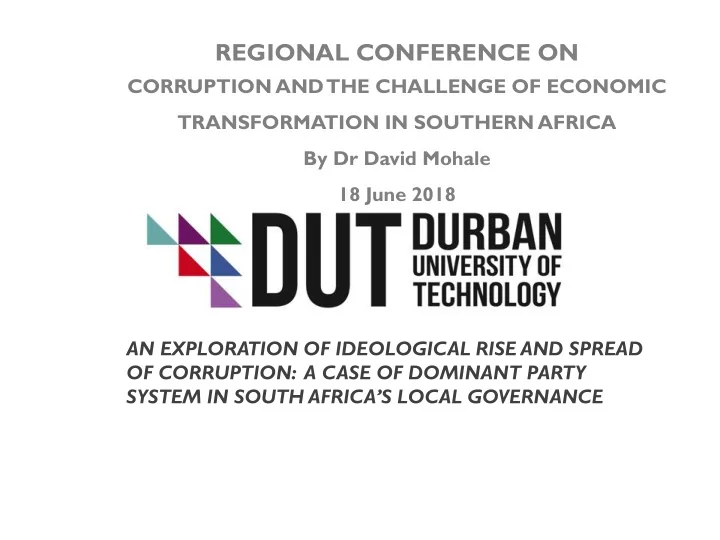

REGIONAL CONFERENCE ON CORRUPTION AND THE CHALLENGE OF ECONOMIC TRANSFORMATION IN SOUTHERN AFRICA By Dr David Mohale 18 June 2018 AN EXPLORATION OF IDEOLOGICAL RISE AND SPREAD OF CORRUPTION: A CASE OF DOMINANT PARTY SYSTEM IN SOUTH AFRICA’S LOCAL GOVERNANCE
PRESENTATION OUTLINE • Introduction 1 • Problematising corruption • Theoretical framework • Post-apartheid transition context • Local government crisis • What is to be done?
INTRODUCTION South Africa recently made headlines for all • wrong reasons 2 • Zuma presidency is largely seen as the catalyst for institutionalisation of corruption an unaccountability The concept ‘ State Capture ’ in SA produces • 64 700 000 results in merely 47 seconds in Google search engine • But the corruption did not start with Zuma? The unresolved Arms Deal saga continues…. Animal Farm climate within the ANC and • the state
PROBLEMATISING CORRUPTION There’s no disputing the deleterious effects of corruption • Phantom binaries (Public versus Private; North versus South; State • versus Market) • Example: What’s worse between a predatory state and the intentionally engineered global financial meltdown? • BOTTOMLINE – Corruption creates “the flight of faith” from democratic processes and key state institutions.
THEORETICAL FRAMEWORK What gives rise to corruption? • Is it nature (innate orientation) or nurture • Chang’s IPE: human beings are not naturally preformed 3 (environmental influence)? • Rational choice: inevitability of maximizing self-interest? The dominance of rules-in-use over formal rules (efforts are • made to subvert and circumvent institutions); Is corruption “an integral part of social life”, therefore • “inevitable”? • What are the costs of challenging the status quo? • Realists: the need for survival against the greater good of humankind? What about collective pauperism? •
POST -APARTHEID CONTEXT • A culture of dominant party system • Consequences: rising arrogance; the intentional weakening of state institutions 4 unaccountability; intra-party factionalism and selective disciplining; politics seen as the ticket for quick self-enrichment; civil society containment and sullen quiescence ; tolerance for corruption in exchange for self- preservation; numerous pathologies including
LOCAL GOVERNMENT CRISIS • Numerous studies confirm state failure at local government level; • Auditor General 2015-16 report: an increase from 1648 to 2015 of false declarations of suppliers; political leadership turning a blind eye on this. Why ? • Irregular expenditure stood at R41.7 billion; increased number of contracts secured through SCM Regulation 32; no consequences
POLITICAL ENTREPRENEURSHIP SYSTEM • Manipulate public meetings that select candidates Impose weak candidates as party regional leaders and • rewarding the loyal but incompetent followers 5 municipal council office bearers (mainly from the PR list) • Impose weak candidates as senior managers in municipalities • Create a pimping system rooted in mutual distrust • Divide and rule (create instability) Impose service providers • • Punish competent and ethical dissidents while
WHAT IS TO BE DONE? • “The proof that the state is a creation of nature and prior to the individual is that the individual, when isolated, is not self- sufficing…” (Aristotle) • Short-term solutions: strengthen the current interventions but move beyond placebos • Long-term solutions: corruption studies to be part of curriculum from the very junior level
Recommend
More recommend